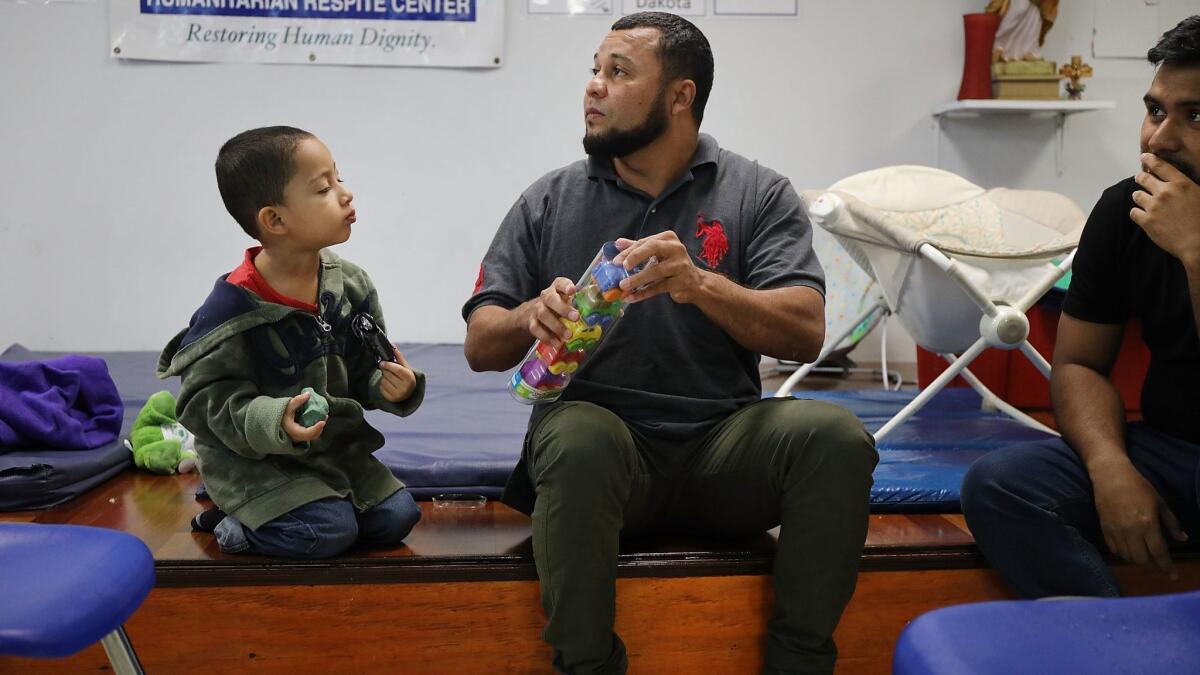Trump administration heads to court, seeking to hold immigrant families in detention

- Share via
Justice Department officials asked a federal judge Thursday to change the rules on holding immigrant children in custody, saying they needed more flexibility to implement President Trump’s executive order to detain families of immigrants caught crossing the border.
A legal settlement the government reached two decades ago interferes with the president’s order because it requires immigration officials to release children promptly to relatives or other custodians, Justice Department attorneys said in a motion filed with the U.S. District Court in Los Angeles.
The terms of the agreement also call for children who are in the government’s custody to be kept in licensed care facilities. That rule, Department of Justice lawyers argued, must be changed in order to clear the way for immigrant families to be detained together in unlicensed facilities. Trump’s order directed the military to make space available on bases to house immigrant families.
“Under current law and legal rulings, including this Court’s, it is not possible for the U.S. government to detain families together during the pendency of their immigration proceedings. It cannot be done,” attorneys for the government wrote in the filing.
The Obama administration had asked in 2015 for similar permission to hold families in detention facilities for extended periods, but was turned down by U.S. District Judge Dolly M. Gee.
Since then, the Justice Department said, the number of families illegally crossing the border has increased sharply.
“Without the option to keep families together during the pendency of removal proceedings, the government must choose between acquiescing to and incentivizing illegal immigration by releasing all family groups, or detaining the parents but separating the family,” the government lawyers wrote.
Peter Schey, the attorney whose legal aid group negotiated the settlement, known as the Flores agreement, on behalf of immigrant children, told the Associated Press on Thursday that he planned to oppose the government’s request to alter its terms.

President Trump may have created a “catch and release” problem now that he has signed an executive order that keeps his “100% prosecution” policy in place and stops the practice of separating families at the border.
The legal filing opened yet another front in the battle over illegal immigration that has roiled the country as Trump and Atty. Gen. Jeff Sessions have deployed hard-line tactics to increase deportations and clamp down on border crossings.
In recent weeks, immigration officials began separating children from their parents after families were caught crossing illegally into the country from Mexico. As political and public outrage over the move grew, Trump and other government officials offered various explanations for why it was necessary, arguing generally that the kids had to be taken so their parents could be prosecuted criminally for crossing the border.
When Trump relented and signed an executive order Wednesday that called for keeping families together, he directed the Justice Department to ask a judge to revisit the terms of the settlement the government signed in 1997 in a class-action case brought on behalf of all immigrant children held in custody. The lead plaintiff in the case was a mother named Jenny Flores.
In the filing, DOJ lawyers argued that many parents attempt to make the often dangerous crossing into the country because they believe that, if they are caught, they will be released with their children and allowed to remain free while their cases wind through the country’s badly backlogged immigration court system.
If the Department of Homeland Security “chose to release every adult apprehended at the border with his or her child(ren), DHS would essentially be signaling that adults with children can illegally cross the border with impunity, thereby encouraging parents to subject themselves and their children to the life-threatening risks that come with efforts to illegally cross the border,” the filing said.
For more news on federal courts in Southern California, follow me on Twitter: @joelrubin
More to Read
Sign up for Essential California
The most important California stories and recommendations in your inbox every morning.
You may occasionally receive promotional content from the Los Angeles Times.











